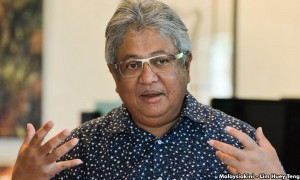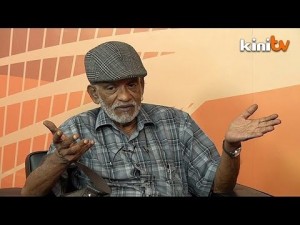S. Thayaparan, May 3, 2017.
“The real world is much bigger than that created by Umno.”
– Zaid Ibrahim
 COMMENT | The last time I wrote about Zaid Ibrahim was when he joined the DAP. I said – “Here is a man who has done everything to alienate the political establishment by espousing views that are anathema to mainstream Malaysian politics.” Reading the latest edition of his book, ‘I, too am Malay’, what sticks out is that Zaid Ibrahim, despite what his critics claim, has pretty much carried the same tune ever since he quit Umno.
COMMENT | The last time I wrote about Zaid Ibrahim was when he joined the DAP. I said – “Here is a man who has done everything to alienate the political establishment by espousing views that are anathema to mainstream Malaysian politics.” Reading the latest edition of his book, ‘I, too am Malay’, what sticks out is that Zaid Ibrahim, despite what his critics claim, has pretty much carried the same tune ever since he quit Umno.
Discussing “Malay” issues is problematic. The race discourse in this country – as it is everywhere else – is toxic. Non-Malays either venerate Malays who think their way or mock those who are on the opposite side of the political divide. Malay oppositional politicians have to navigate between conforming to mainstream non-Malay expectations and Malay communal concerns, which is often mischaracterised by people who claim they are not “racist” but have no problem attributing damaging stereotypes on the Malay community in their war against Umno.
Zaid Ibrahim’s book – its various editions have been translated to Chinese and Malay but sadly no Tamil version (yet) – is a narrative that seeks to explore his “Malayness” that goes beyond the constitutional definition of his community and reaffirm values, both secular and religious, in a time when the country is at a crossroad. Since this is the latest edition, what we soon begin to realise is that the country has always been at a crossroad.
Nothing is off limits in this book and Zaid Ibrahim pulls no punches when it comes to Umno, “Malay” supremacy, Islam and the future of the Malay community. This is a book by a political insider who has no problem burning his bridges in an effort to expand upon his greater truth. While some view his “not playing well with others” reputation as detrimental to the groupthink of the opposition or establishment, I believe the unpredictability serves a purpose.
The problem with Zaid Ibrahim is that he is a politician who believes in ideas when he is operating in an environment that rejects grand ideas in favour of banal pragmatisms and political bromides.
One of the best chapters in the book, ‘What happened during Ramadan (2016)’, is a chronology of public events that show the mean-spiritedness of public officials and religious bureaucrats at a time when they were supposed to demonstrate piety and compassion. It is a description of events that is related in a matter-of-fact manner, but underneath the placid prose is a disdain for the hypocrisy of those who claim to have the moral high ground but are willing to use the low road to achieve their goals.
It is also another opportunity for Zaid to elaborate on the inner workings of a system and officials who have very little to offer when it comes to ideas that encourages inclusivity in a month that demands such, but rather the hypocritical pontifications on race and religion is all that the regime and Islamic types could muster.
 Sometime back, when I interviewed Zaid Ibrahim, the discussion revolved around Islam. When it comes to “Malay” identity and Islam, Zaid’s answer was interesting because as usual it touches on issues which he has been talking about for a very long time.
Sometime back, when I interviewed Zaid Ibrahim, the discussion revolved around Islam. When it comes to “Malay” identity and Islam, Zaid’s answer was interesting because as usual it touches on issues which he has been talking about for a very long time.
From the 2012 interview – “Islam in Malaysia will not allow a Malay to be a non-Muslim. Some Islamic scholars however say that there is no compulsion in the religion. But scholars have no influence in Malaysia; only religious bureaucrats. Nurul (Izzah) is brave to express an opinion; but in Malaysia, Muslims have no right to an opinion on their own religion. They can be punished. Only the state can issue opinions.”
Not a ‘greatest hits’ compilation
However, do not think that this book is just a “greatest hits” compilation which would be dated and of no real contemporary interest. Nearly every chapter in the book is relevant to what is going on now and Zaid Ibrahim has this knack of linking issues faced by Muslim minority communities elsewhere as a mirror to Muslim majority rule here.
For instance, in a chapter titled ‘The marginalisation of the Malays’, Zaid compares the issues facing the minority Muslim community in India with the marginalisation of Indians in this country and how the two communities deal with their respective marginalisation. He also argues that the majority Muslim/Malay community is marginalised in this country “but this is a self-imposed condition made without the coercion or intent of others”.
This is more or less Zaid’s thinking when it comes to governmental policies and communal expectations. When I asked his opinion on whether affirmative-action policies contributed to the ghettoisation of the public and private sectors along racial lines, he answered –
“The problem we have is the inability of some leaders to see the long-term pernicious effects of discrimination. They want instant gratification and support and so they tell the Malays they have special rights. When you take that path, you then will not see you are practicing discrimination.
“Only enlightened Malay leaders can tell the difference between outright discrimination and affirmative support programmes. The Chinese then retaliate and would gang up and support each other, thereby making the situation worse. It’s only the Indians and other natives who are left alone; desolate and poor.”
Now many Malays would not agree with what Zaid Ibrahim has to say about their community and the issues facing their community. These Malays are not necessarily Umno Malays. They are Malays with opinions and perspectives of their own. In his book, Zaid acknowledges this and his ire is against the state propaganda organs and former Umno comrades who attack him with invectives like “liberal”, “ungrateful”, “traitor” and the host of other titles that they bestow upon someone who has left the fold.
What this book attempts to do is to make a rational argument that Zaid, too, is part of the Malay community and that the policies that supposedly favour the Malays are in reality policies that are there to maintain hegemonic control.
This is where the book shines. Moving beyond race and religion, the book is a narrative about failed policies which supposedly exist to maintain racial and religious supremacy but in reality, constrain the Malay polity which in turn creates a toxic environment where Malaysians are at one another’s throats instead of working together for the betterment of all communities.
What I really want is for a Chinese or Indian politician to write about his or her community the way how Zaid Ibrahim has written about his, with a critical eye that exposes the lies and deceptions we have about our individual communities.
S THAYAPARAN is Commander (Rtd) of the Royal Malaysian Navy.
The views expressed here are those of the author/contributor and do not necessarily represent the views of Malaysiakini.
























